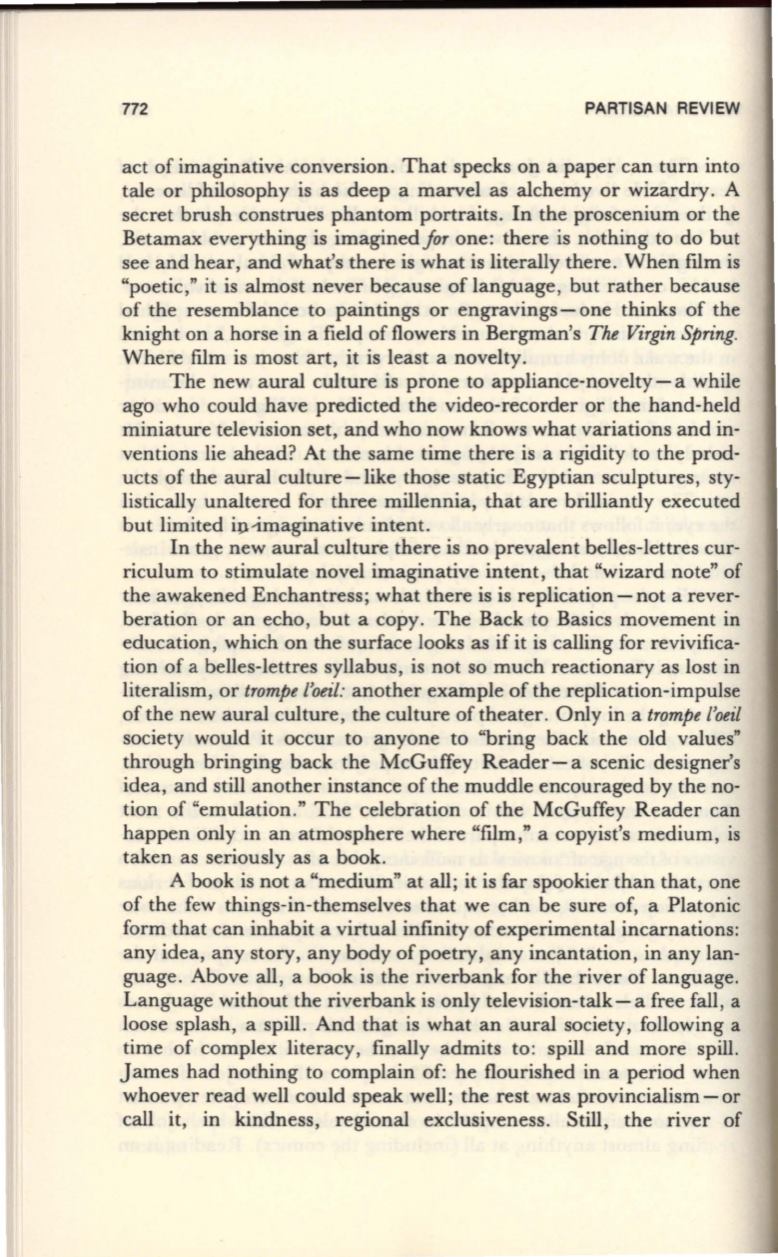
772
PARTISAN REVIEW
act of imaginative conversion. That specks on a paper can turn into
tale or philosophy is as deep a marvel as alchemy or wizardry. A
secret brush construes phantom portraits. In the proscenium or the
Betamax everything is imaginedfor one: there is nothing to do but
see and hear, and what's there is what is literally there. When film is
"poetic," it is almost never because of language, but rather because
of the resemblance to paintings or engravings- one thinks of the
knight on a horse in a field of flowers in Bergman's
The Virgin Spring.
Where film is most art, it is least a novelty.
The new aural culture is prone to appliance-novelty- a while
ago who could have predicted the video-recorder or the hand-held
miniature television set, and who now knows what variations and in–
ventions lie ahead? At the same time there is a rigidity to the prod–
ucts of the aural culture -like those static Egyptian sculptures, sty–
listically unaltered for three millennia, that are brilliantly executed
but limited ill-imaginative intent.
In the new aural culture there is no prevalent belles-lettres cur–
riculum to stimulate novel imaginative intent, that "wizard note" of
the awakened Enchantress; what there is is replication- not a rever–
beration or an echo, but a copy. The Back to Basics movement in
education, which on the surface looks as if it is calling for revivifica–
tion of a belles-lettres syllabus, is not so much reactionary as lost in
literalism, or
trompe l'oeil:
another example of the replication-impulse
of the new aural culture, the culture of theater . Only in a
trompe l'oeil
society would it occur to anyone to "bring back the old values"
through bringing back the McGuffey Reader- a scenic designer's
idea, and still another instance of the muddle encouraged by the no–
tion of "emulation." The celebration of the McGuffey Reader can
happen only in an atmosphere where "film," a copyist's medium, is
taken as seriously as a book.
A book is not a "medium" at all; it is far spookier than that, one
of the few things-in-themselves that we can be sure of, a Platonic
form that can inhabit a virtual infinity of experimental incarnations:
any idea, any story, any body of poetry, any incantation, in any lan–
guage. Above all, a book is the riverbank for the river of language.
Language without the riverbank is only television-talk- a free fall, a
loose splash, a spill. And that is what an aural society, following a
time of complex literacy, finally admits to: spill and more spill.
James had nothing to complain of: he flourished in a period when
whoever read well could speak well; the rest was provincialism-or
call it, in kindness, regional exclusiveness. Still, the river of


